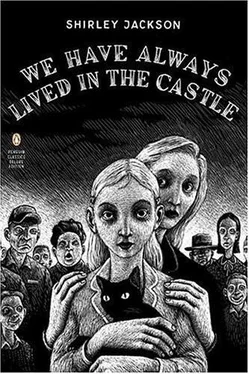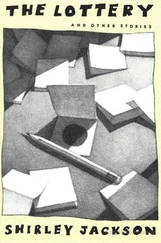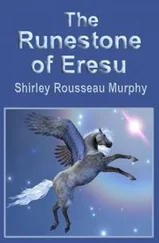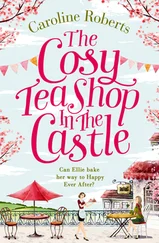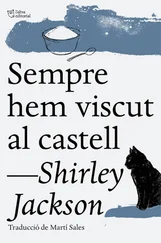Shirley Jackson - We Have Always Lived in the Castle
Здесь есть возможность читать онлайн «Shirley Jackson - We Have Always Lived in the Castle» весь текст электронной книги совершенно бесплатно (целиком полную версию без сокращений). В некоторых случаях можно слушать аудио, скачать через торрент в формате fb2 и присутствует краткое содержание. Город: New York, Год выпуска: 2006, ISBN: 2006, Издательство: Penguin Books, Жанр: Триллер, gothic_novel, на английском языке. Описание произведения, (предисловие) а так же отзывы посетителей доступны на портале библиотеки ЛибКат.
- Название:We Have Always Lived in the Castle
- Автор:
- Издательство:Penguin Books
- Жанр:
- Год:2006
- Город:New York
- ISBN:978-1-101-53065-8
- Рейтинг книги:3 / 5. Голосов: 1
-
Избранное:Добавить в избранное
- Отзывы:
-
Ваша оценка:
- 60
- 1
- 2
- 3
- 4
- 5
We Have Always Lived in the Castle: краткое содержание, описание и аннотация
Предлагаем к чтению аннотацию, описание, краткое содержание или предисловие (зависит от того, что написал сам автор книги «We Have Always Lived in the Castle»). Если вы не нашли необходимую информацию о книге — напишите в комментариях, мы постараемся отыскать её.
is a deliciously unsettling novel about a perverse, isolated, and possibly murderous family and the struggle that ensues when a cousin arrives at their estate.
We Have Always Lived in the Castle — читать онлайн бесплатно полную книгу (весь текст) целиком
Ниже представлен текст книги, разбитый по страницам. Система сохранения места последней прочитанной страницы, позволяет с удобством читать онлайн бесплатно книгу «We Have Always Lived in the Castle», без необходимости каждый раз заново искать на чём Вы остановились. Поставьте закладку, и сможете в любой момент перейти на страницу, на которой закончили чтение.
Интервал:
Закладка:
“I could have worn this scarf,” he said irritably, and I heard him from the vegetable garden where I had found Jonas sleeping in a tangle of young lettuce plants. “It’s an expensive thing, and I like the colors.”
“It belonged to Father,” Constance said.
“That reminds me,” Charles said. “One of these days I’d like to look over the rest of his clothes.” He was quiet for a minute; I thought he was probably sitting down on my bench. Then he went on, very lightly. “Also,” he said, “while I’m here, I ought to go over your father’s papers. There might be something important.”
“Not my papers,” Uncle Julian said. “That young man is not to put a finger on my papers.”
“I haven’t even seen your father’s study,” Charles said.
“We don’t use it. Nothing in there is ever touched.”
“Except the safe, of course,” Charles said.
“Constance?”
“Yes, Uncle Julian?”
“I want you to have my papers afterwards. No one else is to touch my papers, do you hear me?”
“Yes, Uncle Julian.”
I was not allowed to open the safe where Constance kept our father’s money. I was allowed to go into the study, but I disliked it and never even touched the doorknob. I hoped Constance would not open the study for Charles; he already had our father’s bedroom, after all, and our father’s watch and his gold chain and his signet ring. I was thinking that being a demon and a ghost must be very difficult, even for Charles; if he ever forgot, or let his disguise drop for a minute, he would be recognized at once and driven away; he must be extremely careful to use the same voice every time, and present the same face and the same manner without a slip; he must be constantly on guard against betraying himself. I wondered if he would turn back to his true form when he was dead. When it grew cooler and I knew that Constance would be taking Uncle Julian indoors I left Jonas asleep on the lettuce plants and came back into the house. When I came into the kitchen Uncle Julian was poking furiously at the papers on his table, trying to get them into a small heap, and Constance was peeling potatoes. I could hear Charles moving around upstairs, and for a minute the kitchen was warm and glowing and bright.
“Jonas is asleep in the lettuce,” I said.
“There is nothing I like more than cat fur in my salad,” Constance said amiably.
“It is time that I had a box,” Uncle Julian announced. He sat back and looked angrily at his papers. “They must all be put into a box, this very minute. Constance?”
“Yes, Uncle Julian; I can find you a box.”
“If I put all my papers in a box and put the box in my room, then that dreadful young man cannot touch them. He is a dreadful young man, Constance.”
“Really, Uncle Julian, Charles is very kind.”
“He is dishonest. His father was dishonest. Both my brothers were dishonest. If he tries to take my papers you must stop him; I cannot permit tampering with my papers and I will not tolerate intrusion. You must tell him this, Constance. He is a bastard.”
“Uncle Julian—”
“In a purely metaphorical sense, I assure you. Both my brothers married women of very strong will. That is merely a word used—among men, my dear; I apologize for submitting you to such a word—to categorize an undesirable fellow.”
Constance turned without speaking and opened the door which led to the cellar stairs and to the rows and rows of food preserved at the very bottom of our house. She went quietly down the stairs, and we could hear Charles moving upstairs and Constance moving downstairs.
“William of Orange was a bastard,” Uncle Julian said to himself; he took up a bit of paper and made a note. Constance came back up the cellar stairs with a box which she brought to Uncle Julian. “Here is a clean box,” she said.
“What for?” Uncle Julian asked.
“To put your papers in.”
“That young man is not to touch my papers, Constance. I will not have that young man going through my papers.”
“This is all my fault,” Constance said, turning to me. “He should be in a hospital.”
“I will put my papers in that box, Constance, my dear, if you will be kind enough to hand it to me.”
“He has a happy time,” I said to Constance.
“I should have done everything differently.”
“It would certainly not be kind to put Uncle Julian in a hospital.”
“But I’ll have to if I—” and Constance stopped suddenly, and turned back to the sink and the potatoes. “Shall I put walnuts in the applesauce?” she asked.
I sat very quietly, listening to what she had almost said. Time was running shorter, tightening around our house, crushing me. I thought it might be time to smash the big mirror in the hall, but then Charles’ feet were coming heavily down the stairs and through the hall and into the kitchen.
“Well, well, everybody’s here,” he said. “What’s for dinner?”
That evening Constance played for us in the drawing room, the tall curve of her harp making shadows against our mother’s portrait and the soft notes falling into the air like petals. She played “Over the Sea to Skye” and “Flow Gently, Sweet Afton” and “I Saw a Lady,” and other songs our mother used to play, but I never remember that our mother’s fingers touched the strings so lightly with such a breath of melody. Uncle Julian kept himself awake, listening and dreaming, and even Charles did not quite dare to put his feet on the furniture in the drawing room, although the smoke from his pipe drifted against the wedding-cake ceiling and he moved restlessly while Constance played.
“A delicate touch,” Uncle Julian said once. “All the Blackwood women had a gifted touch.”
Charles stopped by the fireplace to knock his pipe against the grate. “Pretty,” he said, taking down one of the Dresden figurines. Constance stopped playing and he turned to look at her. “Valuable?”
“Not particularly,” Constance said. “My mother liked them.”
Uncle Julian said, “My particular favorite was always ‘Bluebells of Scotland’; Constance, my dear, would you—”
“No more now,” Charles said. “Now Constance and I want to talk, Uncle. We’ve got plans to make.”
7
Thursday was my most powerful day. It was the right day to settle with Charles. In the morning Constance decided to make spice cookies for dinner; that was too bad, because if any of us had known we could have told her not to bother, that Thursday was going to be the last day. Even Uncle Julian did not suspect, however; he felt a little stronger on Thursday morning and late in the morning Constance brought him into the kitchen which smelled richly of spice cookies and he continued putting his papers into the box. Charles had taken a hammer and found nails and a board and was pounding away mercilessly at the broken step; from the kitchen window I could see that he was doing it very badly and I was pleased; I wished the hammer to pound his thumb. I stayed in the kitchen until I was certain that they would all keep where they were for a while and then I went upstairs and into our father’s room, walking softly so Constance would not know I was there. The first thing to do was stop our father’s watch which Charles had started. I knew he was not wearing it to mend the broken step because he was not wearing the chain, and I found the watch and the chain and our father’s signet ring on our father’s dresser with Charles’ tobacco pouch and four books of matches. I was not allowed to touch matches but in any case I would not have touched Charles’ matches. I took up the watch and listened to it ticking because Charles had started it; I could not turn it all the way back to where it had formerly been because he had kept it going for two or three days, but I twisted the winding knob backward until there was a small complaining crack from the watch and the ticking stopped. When I was sure that he could never start it ticking again I put it back gently where I had found it; one thing, at least, had been released from Charles’ spell and I thought that I had at last broken through his tight skin of invulnerability. I need not bother about the chain, which was broken, and I disliked the ring. Eliminating Charles from everything he had touched was almost impossible, but it seemed to me that if I altered our father’s room, and perhaps later the kitchen and the drawing room and the study, and even finally the garden, Charles would be lost, shut off from what he recognized, and would have to concede that this was not the house he had come to visit and so would go away. I altered our father’s room very quickly, and almost without noise.
Читать дальшеИнтервал:
Закладка:
Похожие книги на «We Have Always Lived in the Castle»
Представляем Вашему вниманию похожие книги на «We Have Always Lived in the Castle» списком для выбора. Мы отобрали схожую по названию и смыслу литературу в надежде предоставить читателям больше вариантов отыскать новые, интересные, ещё непрочитанные произведения.
Обсуждение, отзывы о книге «We Have Always Lived in the Castle» и просто собственные мнения читателей. Оставьте ваши комментарии, напишите, что Вы думаете о произведении, его смысле или главных героях. Укажите что конкретно понравилось, а что нет, и почему Вы так считаете.
